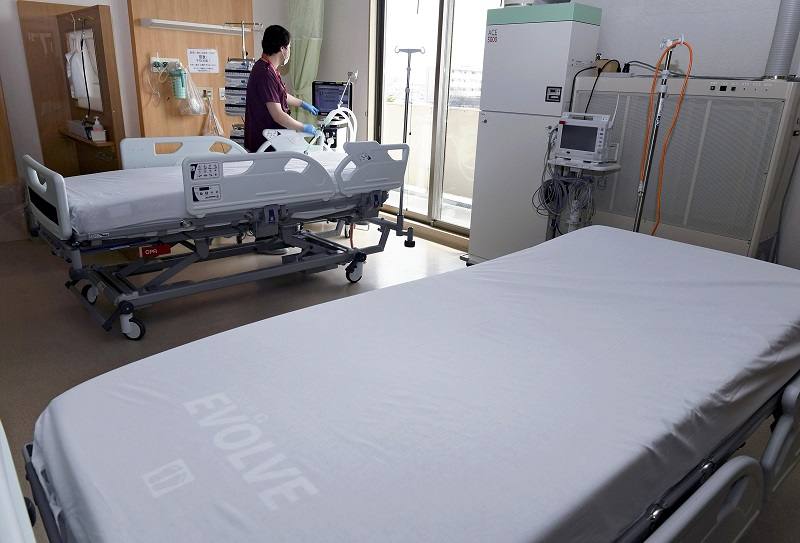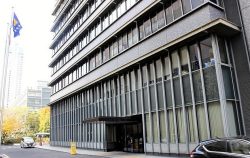
A hospital bed secured for COVID-19 patients
7:00 JST, May 12, 2022
The government is considering giving central and prefectural governments more power over medical institutions in the event of a rapid spread of the coronavirus or other infectious diseases, several sources said.
It began discussions to revise the Infectious Diseases Control Law, hoping to submit a bill to an extraordinary Diet session scheduled for autumn.
Under proposals being considered, local governments would be authorized to take legally binding measures such as “ordering” medical institutions to secure hospital beds.
The second clause of Article 16 in the current law states that the health minister or a governor can request medical institutions to cooperate in the fight against infectious diseases. Under this provision, they are requesting hospitals to secure beds for COVID-19 patients.
Since a law revision in February last year, they are also allowed to “give a recommendation” — stronger than a “request” — to hospitals that fail, without justifiable grounds, to comply with their requests. Authorities can publicly announce the names of medical institutions that do not follow the recommendations, but a recommendation is still not a legal obligation.
During the fifth COVID-19 infection wave that lasted until last autumn, however, many hospital beds could not be used due to a shortage of medical staff. They were satirized as “ghost beds.”
“Some medical institutions do not comply with requests, and there is a risk of a shortfall in hospital beds if the infections spread rapidly in the future,” a senior health ministry official said.
Under the circumstances, the central government deemed it necessary to develop a legal framework in which local governments can take legally binding measures while taking account of frontline medical conditions, such as staff shortages.
The law revision has been low on the agenda since Prime Minister Fumio Kishida’s administration was inaugurated in October last year, as it put priority on coping with the sixth wave of infections, driven by the omicron variant.
The central government wants legally binding instructions to be also issued in regard to the establishment and administration of temporary medical facilities, vaccinations and virus testing.
Meanwhile, when prefectures contain municipalities — such as ordinance-designated cities, special wards and core cities — that operate their own public health centers, a lack of coordination between the prefectural and municipal governments has been a problem. The central government is considering strengthening the powers of the governors of those prefectures to streamline the situation.
Opposition from medical associations and municipalities can be expected if the central and prefectural governments are given more authority, and the central government will carefully consider the requirements for issuing instructions.
Top Articles in Society
-

Man Infected with Measles May Have Come in Contact with Many People in Tokyo, Went to Store, Restaurant Around When Symptoms Emerged
-

Woman with Measles Visited Hospital in Tokyo Multiple Times Before Being Diagnosed with Disease
-

Australian Woman Dies After Mishap on Ski Lift in Nagano Prefecture
-

Foreign Snowboarder in Serious Condition After Hanging in Midair from Chairlift in Nagano Prefecture
-

Record-Breaking Snow Cripples Public Transport in Hokkaido; 7,000 People Stay Overnight at New Chitose Airport
JN ACCESS RANKING
-

Japan Institute to Use Domestic Commercial Optical Lattice Clock to Set Japan Standard Time
-

Israeli Ambassador to Japan Speaks about Japan’s Role in the Reconstruction of Gaza
-

Man Infected with Measles May Have Come in Contact with Many People in Tokyo, Went to Store, Restaurant Around When Symptoms Emerged
-

Prudential Life Insurance Plans to Fully Compensate for Damages Caused by Fraudulent Actions Without Waiting for Third-Party Committee Review
-

Woman with Measles Visited Hospital in Tokyo Multiple Times Before Being Diagnosed with Disease























